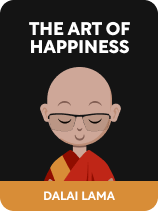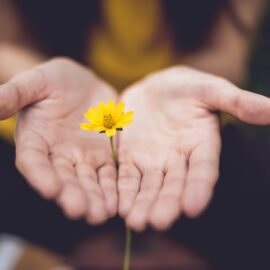

This article is an excerpt from the Shortform book guide to "The Art of Happiness" by Dalai Lama. Shortform has the world's best summaries and analyses of books you should be reading.
Like this article? Sign up for a free trial here .
What is the doctrine of Buddha Nature? If humans are good by their nature, why do they get tangled up in so much conflict and negativity?
Buddhists believe that all humans possess what they call “Buddha Nature”—the fundamental nature of all conscious beings. The belief in Buddha Nature is essentially the belief in humans’ intrinsic state of purity and positivity. Anything negative—like conflict and negative emotions such as anger and hatred—are rooted in ignorance or intellect.
Keep reading to learn about the Buddhist concept of Buddha Nature.
What Is Buddha Nature?
Buddhists of different schools perceive Buddha Nature differently. Some believe that you’re born with the seed of Buddha Nature but must nurture it into bloom yourself. Others believe that your Buddha Nature is already fully developed but hidden by your misconceptions of the world. Your goal, then, is to rid yourself of those misconceptions.
If you don’t believe in Buddha Nature, you’ll find proof of humans’ innate compassion by observing our behavior, claims the Dalai Lama: Children need the compassion, care, and love of their families to survive. Because they’re necessary to survival, these emotions must be fundamental to human nature. We’ll call such innate, life-sustaining emotions positive emotions. Cutler adds that there’s scientific research proving humans are inherently kind and altruistic.
(Shortform note: While there is, as the Dalai Lama and Cutler say, evidence of humans’ innate altruism, kindness, and caring, we can’t deny the existence of war, poverty, and hatred. Researchers have tried to account for this by proposing that in the hunter-gatherer societies of 15,000 years ago (and in modern-day ones), altruism was an important survival mechanism. However, when humans developed an agricultural lifestyle, altruism was by necessity replaced with self-serving behavior and hierarchies, which led to conflict. We’ll discuss why later in the chapter.)
Negative Emotions Are Rooted in Ignorance, Not Human Nature
According to the Dalai Lama, while positive emotions are part of human nature, other emotions, like hatred, envy, and anger, are not. We’ll call such emotions negative. Negative emotions grow from a fundamental misunderstanding of how the world works—what Buddhists call “ignorance.” For instance, you may feel the negative emotion of envy toward your wealthy colleague; however, that envy is based on a misunderstanding: You believe that you’re a separate entity from your neighbor, but in reality, there’s no firm boundary between you two.
| What Is Ignorance in Buddhism? Cutler and the Dalai Lama don’t elaborate on how Buddhism defines “ignorance.” Let’s take a look at the incorrect beliefs that the term “ignorance” in Buddhism encompasses: The belief in permanence: We cling to states and objects and want them to last forever, not understanding that all things must change. The belief in independent existence: All existence is conditional. Something creates a noise, for instance—noise doesn’t exist independent of its source. Similarly, outside factors shape humans and their thoughts and behaviors. The belief in the self: We believe we have a permanent identity when in reality, we’re a composite of five ever-changing factors: physical form, emotions, sensory perception, thoughts, and consciousness. The failure to understand the Four Noble Truths: The Four Noble Truths truth are the truth of suffering (suffering is inherent to human existence), the origin of suffering (suffering is caused by hatred, craving, and ignorance), the ending of suffering (by achieving Nirvana, a state of enlightenment), and the path toward ending suffering (the Noble Eightfold Path, which includes eight areas of life in which to better yourself). |
Beyond being misguided, negative emotions make life harder, claims the Dalai Lama. If you feel envious of your neighbor, you may behave badly toward them and ruin your relationship.
(Shortform note: The Dalai Lama proposes that negative emotions always make life harder. But can they ever make life easier by steering you clear of bad decisions? Often, in dating, you’re told to heed your instincts—aversion, for instance—as they’re an accurate indication of whether you’ll get along with someone in the long term. Therefore, heeding negative instincts could help preserve your wellbeing.)
Conflict Is Rooted in Intellect, Not Human Nature
The Dalai Lama also specifically addresses conflict and war, claiming these are the products of our intellect, not human nature. Human intellect grew after human compassion to help us navigate increasingly complex societies, says the Dalai Lama. When not coupled with compassion, intellect can be harmful. For instance, we’ve used intellect to harvest energy from natural resources. But, unbalanced by compassion for nature, this intellect has led us to wreak havoc on the planet.(Shortform note: Anthropologists have made findings that confirm the Dalai Lama’s idea that humans are compassionate first and intelligent—or intelligently self-serving—second. As discussed, altruism was key to survival in hunter-gatherer societies, but not in agricultural societies, which emerged around 12,000 years ago. With farming came the need for specialized positions and hierarchical structures within communities. More complex communities then began dominating simpler communities and taking their resources.)

———End of Preview———
Like what you just read? Read the rest of the world's best book summary and analysis of Dalai Lama's "The Art of Happiness" at Shortform .
Here's what you'll find in our full The Art of Happiness summary :
- The Dalai Lama's Buddhist path toward happiness
- The use of scientific evidence to support the Dalai Lama's beliefs
- Concrete actions you can take to improve your outlook on life, relationships, and resilience






